- Home
- Harry Harrison
Winter in Eden Page 2
Winter in Eden Read online
Page 2
There was blackened ruin here. Fire had swept along the hall and through the transparent panels overhead. The air was heavy with the smell of smoke—and of burnt flesh. Spear ready he walked the length of the hall, the only part of the hanalè he had ever seen, and on to the turning at the end. A scorched doorway led to a large chamber—where the smell of charred flesh was overpowering. More than enough light filtered down through the burnt ceiling above to reveal the dreadful contents of the room.
Almost at his feet, burned and dead with her mouth gaping wide, was Ikemend, the keeper of the hanalè. Behind her were the huddled shapes of her charges. The room was packed with them, now burnt and as dead as their keeper. Kerrick turned away, shuddering, and made his way deeper into the structure.
It was a maze of connecting rooms and passages, for the most part charred and destroyed. Yet further on the wood was greener, this section recently grown, and scarcely touched by the fire. At the last turning he entered a chamber with ornate hangings on the walls, soft cushions on the floor. Huddled against the far wall, their eyes bulging and their jaws dropped in juvenile fear, were two young males. They moaned when they saw him.
“It is death,” they said and closed their eyes.
“No!” Kerrick called out loudly. “Correction of statement. Foolishness of males—attention to a superior speaking.”
Their eyes flew open with astonishment at this.
“Speak,” he ordered. “Are there others?”
“The creature that talks points the sharp tooth that kills,” one of them moaned.
Kerrick dropped his spear onto the matting and moved away from it. “The killing is over. Are you two alone?”
“Alone!” they wailed in unison and their hands flashed the colors of juvenile terror and pain. Kerrick fought to keep his temper with the stupid creatures.
“Listen to me and be silent,” he ordered. “I am Kerrick strong-and-important who sits at the Eistaa’s side. You have heard of me.” They signed agreement: perhaps knowledge of his flight had not penetrated their isolation. Or, more simply, they had forgotten. “Now you will answer my questions. How many of you are here?”
“We hid,” the younger one said, “it was a game that we were playing. The others had to find us. I was over there, Elinman hid with me, and Nadaskè behind the door. But the others never came. Something happened. It was very warm and nice, and then bad smells came in clouds that hurt our eyes and throats. We called for Ikemend to help us, but she never came. We were afraid to go out. I was too frightened, they named me Imehei because I am like that, but Elinman is very bold. He led the way and we followed. What we saw I cannot tell you, it was too dreadful. We wanted to leave the hanalè even though that is forbidden and Elinman did and screamed and we ran back inside. What will become of us?”
What would indeed happen to them? Certain death if the hunters came upon them. They would see only murgu with claws and teeth, the enemy. But Kerrick saw them for what they were; sheltered, stupid creatures, barely able to care for themselves. He couldn’t allow them to be killed, was weary of killing at last.
“Stay here,” he ordered.
“We are afraid and hungry,” Imehei wailed. Soft-to-touch, that was what his name was. True enough. And the other, Nadaskè, looks-out-from-the-enclosure. They were like children, worse than children for they would never grow up.
“Silence—I command it. You have water here and are plump enough to go hungry for a bit. You will not leave this room. Meat will be brought to you. Do you understand?”
They were calm now, signalled ready obedience, secure in being commanded and watched over. Males! He took up his spear and left them there. Went back through the immensity of the structure and when he emerged Herilak was waiting for him. Behind him were the rest of the hunters, while Sanone and his Sasku were grouped to one side.
“We are leaving,” Herilak said. He had his anger under control now—but it had been replaced with a cold resolve. “What we came to do—has been done. The murgu and their nest have been destroyed. There is nothing more for us here. We return to the sammads.”
“You must stay. There is still work to be done . . .”
“Not for Tanu. You were our margalus, Kerrick, and you led us well against the murgu and we honor you for that and we obeyed you. But now that the murgu are dead you no longer command us. We are leaving.”
“Have you been selected to speak for all of them, strong Herilak?” Kerrick said angrily. “I do not remember this selection.” He turned to the hunters. “Does Herilak speak for you—or have you minds of your own?”
Some turned away from his anger, but the sammadar Sorli stepped forward. “We have thoughts of our own, and we have talked. Herilak tells the truth. There is nothing for us here. What is done is done and we must return to our sammads before the winter. You must come as well, Kerrick, your sammad is to the north, not here.”
Armun. At the thought of her this city of death was nothing. She was his sammad, she and the baby, and he almost gave way, joined them in the march north. But behind Sorli was Sanone and his Sasku and they had not moved. Kerrick turned toward them, spoke.
“And what do the Sasku say of this?”
“We have spoken as well and have not yet finished with the speaking. We have just come to this new place, there is much here to be seen and spoken of—and we do not share the same need for the frozen north that the Tanu do now. We understand them. But we seek different things.”
“Just a small time,” Kerrick said, wheeling about to face the hunters. “We must sit and smoke and confer on this. Decisions must be made—”
“No,” Herilak said. “Decisions have been made. What we have come to do we have done. We start back today.”
“I cannot leave with you now.” Kerrick heard the strain in his voice, hoped the others could not hear it as well. “It is also my wish to return. Armun is there, my sammad, but I cannot go back with you yet.”
“Armun will be under my care,” Herilak said. “If you do not wish to come with us she will be safe in my sammad until you return.”
“I cannot leave yet. The time is not ready, it requires thought.”
He was speaking to their backs. The decision had been taken, the talking was finished. The battle was done and the hunters were free again. They followed Herilak in silence down the path through the trees.
And none glanced back, not one Tanu. Kerrick stood and watched until the last of them were gone from sight, felt that some important part of him had gone with them. What had turned his victory into his defeat? He willed himself to follow them, to plead with them again to come back, and if they did not he wanted to join them on the trail, the trail that led to Armun and his life.
But he did not. Something equally strong kept him here. He knew that he belonged with Armun, with the Tanu, for he was Tanu.
Yet he had talked with the foolish male Yilanè, had commanded them as a Yilanè, had felt the strength and power of his position. Could that be it? Was he at home in this ruined city as he had never been among the sammads in the north?
He felt pulled in two directions and could not decide, could only stand and look at the empty trees, torn by emotions he could not understand, taking in breath after shuddering breath.
“Kerrick,” the voice said, speaking as though from a great distance and he realized that Sanone was talking to him. “You are still margalus. What are your orders?”
There was understanding in the old man’s eyes; the manduktos of the Sasku knew the hidden secrets of others. Perhaps he knew Kerrick’s inner feelings better than he did himself. Enough. There was much to be done. He must put all thought of Armun from him now.
“We will need food,” he said. “I will show you the fields where the animals are kept for slaughter. Surely they could not all have been burned. And all of the dead here, something must be done with them.”
“Into the river before they rot,” Sanone said grimly. “It will carry them out to sea.”
�
�Yes, that will take care of them. Order it done. Then choose those who will come with me. I will show them the way to the animals. We will eat—after that there is much that we will have to do.”
belesekesse ambeiguru desguru kak’kusarod. murubelek murubelek.
YILANÈ APOTHEGM
Those who swim to the top of the highest wave can only sink in the deepest trough.
CHAPTER TWO
Erafnais ordered everyone below, crewmembers and passengers alike, as the uruketo swam out into the open sea. But she remained there on top of the fin when the storm washed over them, transparent membranes closed over her eyes against the driving rain. Between showers she had a single glimpse of the burnt city, smoke roiling high above it, the beaches empty of life. The vision burned into her memory and she could see it clearly still even when the rain returned; would see it always. She remained there at her station until dark, when the uruketo slowed, swimming easily with the current as it would until daylight returned. Only then did she descend wearily to the base of the fin where she spent the entire night, sleeping at the vacant steering position.
When the transparent viewing disc above her grew light with dawn Erafnais unwrapped her sleeping cloak and climbed wearily to her feet. The old injury to her back hurt as she climbed slowly up the inside of the fin to the observation post above. The morning air was cool and fresh. All the clouds of the previous day’s storm had blown away and the sky was clear and bright. The fin swayed as the uruketo stirred and the ponderous creature moved faster in the growing light. Erafnais glanced down, checking that the crewmember was at her steering station, then looked out at the ocean again. There was a ripple of foam in front of the great beak as the pair of accompanying enteesenat surged ahead. All was as it should be with the voyage.
Yet nothing was as it should be. The dark thoughts that Erafnais had kept at bay while she slept surged up and overwhelmed her. Her thumbs grasped hard at the uruketo’s thick hide; the sharp claws on her toes sinking deep as well. Inegban* had come to Alpèasak at last, she had helped in this, and Alpèasak had grown strong. And had died in a single day. She had watched and not understood; in her lifetime at sea had never even heard of fire. Now she knew all about it. It was hot, hotter than the sun, and cracked and roared and stank and choked those who came close, grew bright then black. And had killed the city. The handful of survivors still reeking of the fire’s darkness lay below. The rest of the Yilanè and fargi were as dead as the city, dead in the city that lay behind them. She shuddered and stared resolutely ahead, afraid to look behind lest she see that place of sorrow again. If it had been her city she would be as dead as the others, for those whom the fire had not consumed had of course died when the city died.
But now she had other problems to face. The scientist Akotolp was below, still holding to the arm of the male that she had dragged aboard. But she had not moved since then, had just sat in motionless silence even when addressed. Sat and ignored the pleas and moans of the male to be released. What could be done with her? And what of those others below, the deathless ones? What was to be done? Finally, she must consider—the other. The one whose name no one spoke.
Erafnais shuddered and drew back as Vaintè climbed up inside the fin. It was as though in thinking of her Erafnais had summoned her—the last creature she wished to see this sunbright morning.
Without acknowledging the commander’s presence, Vaintè went to the rear of the fin and stared out at their bubbling wake. Erafnais was aware of her actions and, despite her fears, turned as well and also looked out toward the horizon. It was darker there. The remaining shadow of the night, a storm perhaps, surely it could not be the land—and the city. That was too far behind them to be seen. One of Vaintè’s eyes rolled back in her direction; Erafnais spoke.
“You boarded in silence Vaintè and have remained silent since. Are they—dead?”
“All dead. The city dead as well.”
Even through the terror of the words, Erafnais was aware of Vaintè’s strange manner of speaking. Not as superior to inferior or even equal to equal, but instead in a flat and unfeeling manner that was most unusual. As though she were alone with no one else present, speaking her thoughts to herself.
Erafnais wished to be silent, but spoke despite this, the question coming as though of its own free will. “The fire—where did the fire come from?”
Vaintè’s rigid mask vanished in an instant and her entire body shivered in the grip of intense emotion, her jaw gaped so wide in the expression of hatred/death that her meaning was muffled and confused. “Ustuzou who came . . . ustuzou of fire . . . hatred of those . . . hatred of him. Death. Death. Death.”
“Death,” a voice said harshly, hands moving in the reflexive position of taking-back-upon-self. Erafnais only heard the sound for Enge had climbed up behind her. But Vaintè could see her and understood well enough and there was venom in every motion of her response.
“Daughter of Death, you and yours should be back in that fire-city. The best of the Yilanè who died deserve to be here in your place.”
In her anger she had spoken as one of equal to equal, as efenselè to efenselè. When you grew in the sea with others, emerged with them in the same group, your efenburu, it was a fact never considered; like the air one breathed. You were efenselè to the others in your efenburu for life. But Enge would not accept that.
“Your memory is weak, inferior one.” She said this in the most insulting manner, the highest of the high to the lowest of the low. Erafnais, standing between them, moaned with terror, her crest flaming first red then orange as she fled below. Vaintè reeled back as though struck a physical blow. Enge was pitiless.
“You have been disowned. Your shame is upon me and I reject you as an efenselè. Your reckless ambition to kill Kerrick-ustuzou, all ustuzou, has destroyed proud Alpèasak instead. You ordered low-creature Stallan to kill my companions. Since the egg of time there has been no one like you. Would you had never emerged from the sea. If our entire efenburu had died there in the wet silence, myself included, it would have been better than this.”
Vaintè’s skin had first flared with rage when Enge spoke, but quickly darkened as her body grew still. Her anger was sealed inside now, to be used when needed—and not to be wasted on this inferior being who was once her equal.
“Leave me,” she said, then turned back to the empty sea.
Enge turned away as well, breathing deeply and ashamed of herself for the unbidden anger. This was not what she believed in, what she preached to others. With great effort she stilled the movements of her limbs, the glaring colors of her palms and crest. Only when she was stonelike and as uncommunicative as Vaintè did she permit herself to speak. Below her was the crewmember guiding the uruketo through the sea; close behind her was the commander. Enge leaned down and made the sound of speaking-attention.
“From one-who-follows to one-who-leads, would Erafnais give pleasure by joining here?”
Erafnais climbed reluctantly up, aware of silent Vaintè, back turned and staring out at the sea. “I am here, Enge,” she said.
“My thanks and the gratitude of those with me, for saving us from destruction. Where are you bound?”
“Where?” Erafnais echoed the question, then felt shame. She was the commander yet had not thought of their destination at all. She blurted the truth with shallow movements of apology.
“We fled the fire, out to sea, our course as it always is east to Entoban*. This was done with the panic of flight and not the wisdom of command.”
“Dismiss the shame—for you have saved us all and there is only gratitude. Entoban* of the Yilanè must be our destination. But which city?”
The question brought the answer instantly.
“Home. Where my efenburu is, where this uruketo first entered the sea. Seagirt Ikhalmenets.”
Though still staring out at the surging waves, Vaintè had turned one eye to follow the conversation. She asked for attention to communication but only Erafnais looked her way.
/>
“Ikhalmenets-of-the-islands is not Entoban*. Respectfully request course to Mesekei.”
Erafnais acknowledged the request, yet politely but firmly reaffirmed their destination. Vaintè could see that her wrongheadedness could not be altered so was silent. There would be other ways to reach her destination—for reach it she must. Mesekei was a great city on a great river, rich and prosperous and far from the cold of the north. More important—they had aided her more than any other city in the war against the ustuzou. The future now was gray and impenetrable when she looked at it, her numbed mind empty of all thought. A time would come when the grayness must lift and she would be able to think once again of the future. At that time it would be good to be in a city among friends. There would be other uruketo in Ikhalmenets; some way would be found.
Companions there—but only enemies here. Through the grayness this ugly fact loomed large. Enge and her Daughters of Death still lived—while all those so deserving of life now lay dead. This should not be—nor would it be. There was nothing that could be done here at sea. She was alone against them all; could expect no aid from Erafnais and her crew-members. Once ashore this would all change. How could she change it? Her thoughts were stirring to life now and she concealed them by her rigidity of body.
Behind her Enge signed respectful withdrawal to the commander and climbed below. When she had reached the bottom of the fin she looked back at Vaintè’s motionless figure, then felt for an instant that she could almost see her mind at work. Evil, dark and deadly. Vaintè’s ambitions would never change, never. These thoughts filled Enge so strongly that her limbs stirred despite her attempts at control, even in the dim phosphorescent glow they could be easily understood. She banished them and walked slowly through the semidarkness. Past the immobile Akotolp and her miserable male companion and on to the small group huddled against the wall. Akel stood and turned toward her—then drew back as she approached.

 Arm of the Law
Arm of the Law The Velvet Glove
The Velvet Glove The K-Factor
The K-Factor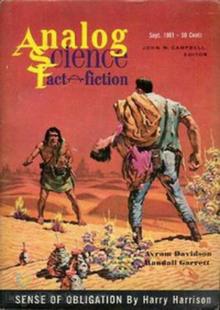 Sense of Obligation
Sense of Obligation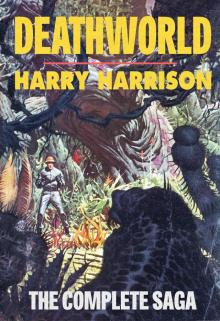 Deathworld: The Complete Saga
Deathworld: The Complete Saga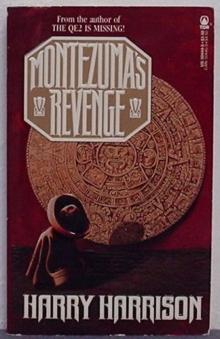 Montezuma's Revenge
Montezuma's Revenge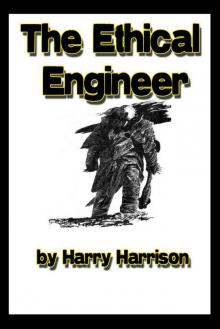 The Ethical Engineer
The Ethical Engineer The Stainless Steel Rat Returns
The Stainless Steel Rat Returns The Misplaced Battleship
The Misplaced Battleship The Stainless Steel Rat is Born
The Stainless Steel Rat is Born Planet of the Damned bb-1
Planet of the Damned bb-1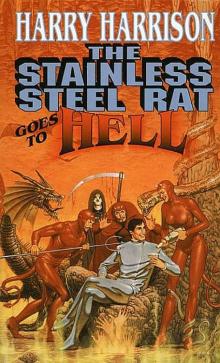 The Stainless Steel Rat Goes to Hell ssr-10
The Stainless Steel Rat Goes to Hell ssr-10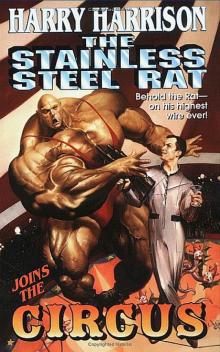 The Stainless Steel Rat Joins the Circus ssr-11
The Stainless Steel Rat Joins the Circus ssr-11 Galactic Dreams
Galactic Dreams The Harry Harrison Megapack
The Harry Harrison Megapack In Our Hands the Stars
In Our Hands the Stars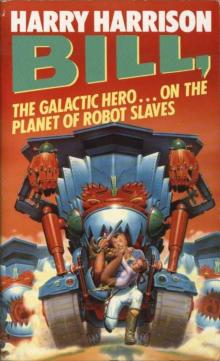 On the Planet of Robot Slaves
On the Planet of Robot Slaves The Military Megapack
The Military Megapack Make Room! Make Room!
Make Room! Make Room! Wheelworld
Wheelworld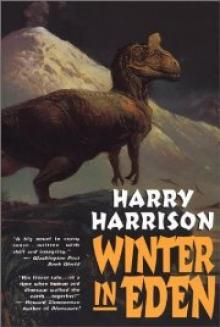 Winter in Eden e-2
Winter in Eden e-2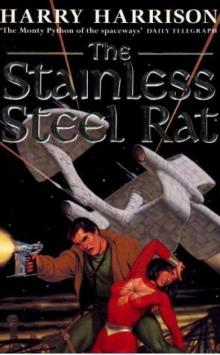 The Stainless Steel Rat
The Stainless Steel Rat The Stainless Steel Rat Goes to Hell
The Stainless Steel Rat Goes to Hell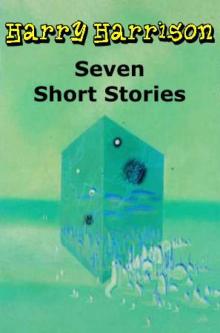 Harry Harrison Short Stoies
Harry Harrison Short Stoies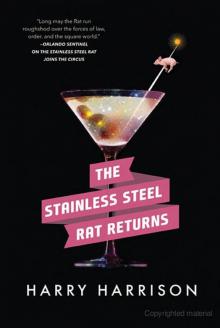 Stainless Steel Rat 11: The Stainless Steel Rat Returns
Stainless Steel Rat 11: The Stainless Steel Rat Returns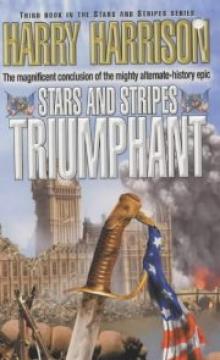 Stars and Stripes Triumphant sas-3
Stars and Stripes Triumphant sas-3 West of Eden
West of Eden The Stainless Steel Rat Go's To Hell
The Stainless Steel Rat Go's To Hell The Stainless Steel Rat eBook Collection
The Stainless Steel Rat eBook Collection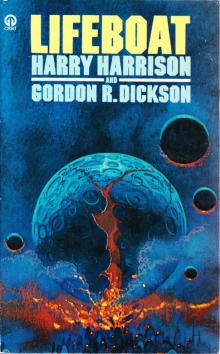 Lifeboat
Lifeboat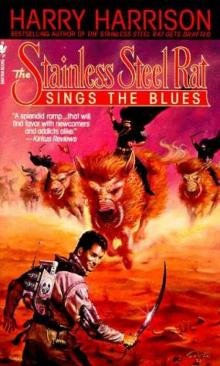 The Stainless Steel Rat Sings the Blues
The Stainless Steel Rat Sings the Blues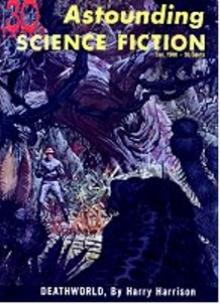 Deathworld tds-1
Deathworld tds-1 On the Planet of Zombie Vampires
On the Planet of Zombie Vampires The Daleth Effect
The Daleth Effect On The Planet Of The Hippies From Hell
On The Planet Of The Hippies From Hell The Turing Option
The Turing Option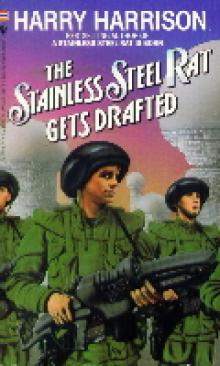 The Stainless Steel Rat Gets Drafted
The Stainless Steel Rat Gets Drafted Bill, the Galactic Hero btgh-1
Bill, the Galactic Hero btgh-1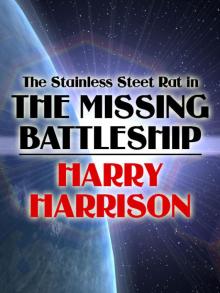 The Stainless Steel Rat in The Missing Battleship
The Stainless Steel Rat in The Missing Battleship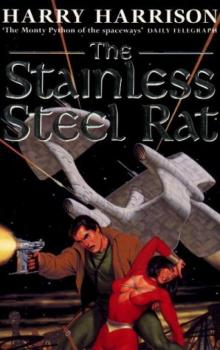 The Stainless Steel Rat ssr-1
The Stainless Steel Rat ssr-1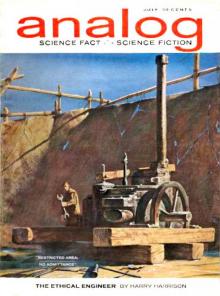 The Ethical Engineer (the deathworld series)
The Ethical Engineer (the deathworld series) The Stainless Steel Rat Saves the World ssr-3
The Stainless Steel Rat Saves the World ssr-3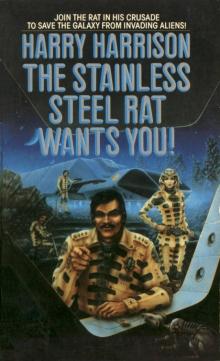 The Stainless Steel Rat Wants You
The Stainless Steel Rat Wants You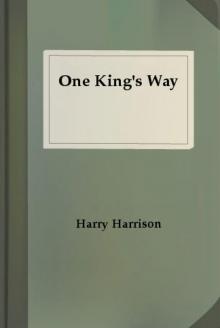 One King's Way thatc-2
One King's Way thatc-2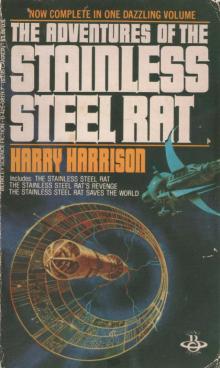 The Stainless Steel Rat Saves The World
The Stainless Steel Rat Saves The World Bill, the Galactic Hero
Bill, the Galactic Hero Stars & Stripes Forever
Stars & Stripes Forever Stars and Stripes In Peril sas-2
Stars and Stripes In Peril sas-2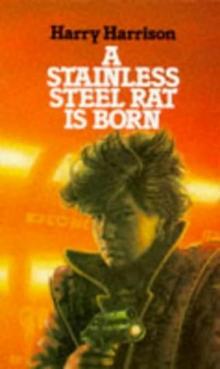 A Stainless Steel Rat Is Born ssr-6
A Stainless Steel Rat Is Born ssr-6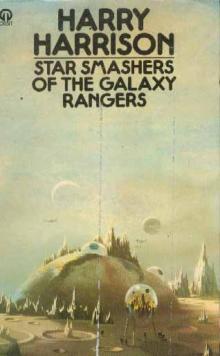 Star Smashers of the Galaxy Rangers
Star Smashers of the Galaxy Rangers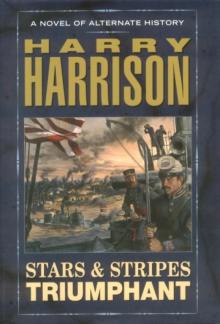 Stars & Stripes Triumphant
Stars & Stripes Triumphant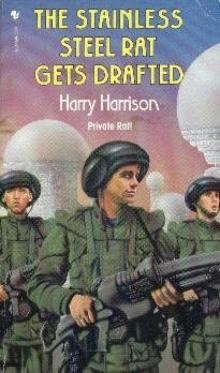 The Stainless Steel Rat Gets Drafted ssr-7
The Stainless Steel Rat Gets Drafted ssr-7 The Stainless Steel Rat for President ssr-5
The Stainless Steel Rat for President ssr-5 The Hammer & the Cross
The Hammer & the Cross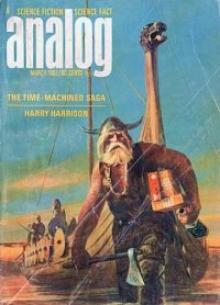 The Technicolor Time Machine
The Technicolor Time Machine The Hammer and The Cross thatc-1
The Hammer and The Cross thatc-1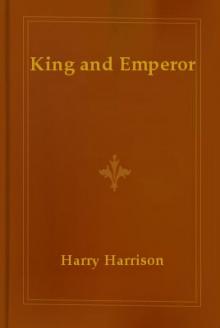 King and Emperor thatc-3
King and Emperor thatc-3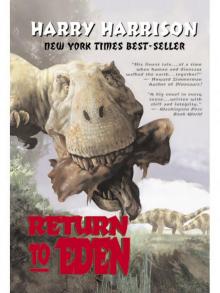 Return to Eden
Return to Eden The Stainless Steel Rat’s Revenge ssr-2
The Stainless Steel Rat’s Revenge ssr-2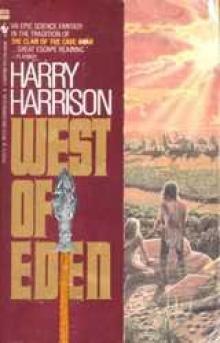 West of Eden e-1
West of Eden e-1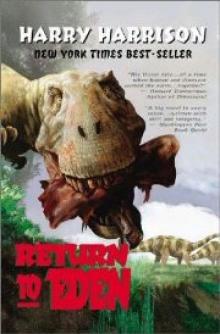 Return to Eden e-3
Return to Eden e-3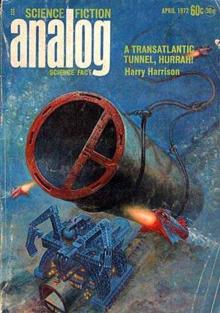 A Transatlantic Tunnel, Hurrah!
A Transatlantic Tunnel, Hurrah! Stars and Stripes Forever sas-1
Stars and Stripes Forever sas-1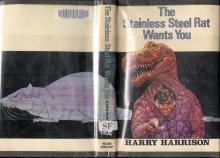 The Stainless Steel Rat Wants You ssr-4
The Stainless Steel Rat Wants You ssr-4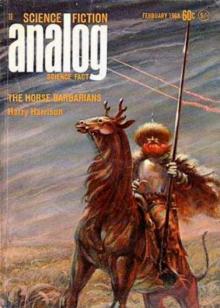 The Horse Barbarians tds-3
The Horse Barbarians tds-3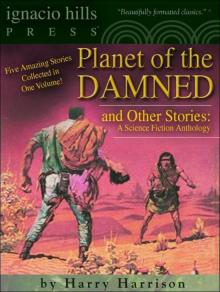 Planet of the Damned and Other Stories: A Science Fiction Anthology (Five Books in One Volume!)
Planet of the Damned and Other Stories: A Science Fiction Anthology (Five Books in One Volume!) On the Planet of Bottled Brains
On the Planet of Bottled Brains Stars And Stripes In Peril
Stars And Stripes In Peril The Stainless Steel Rat's Revenge
The Stainless Steel Rat's Revenge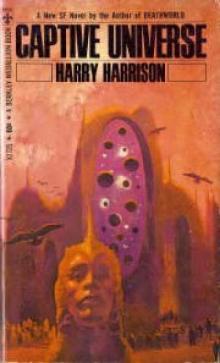 Captive Universe
Captive Universe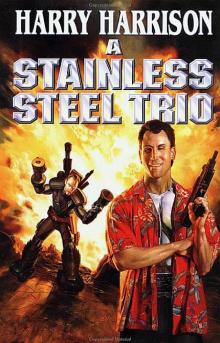 The Stainless Steell Rat Sings the Blues ssr-8
The Stainless Steell Rat Sings the Blues ssr-8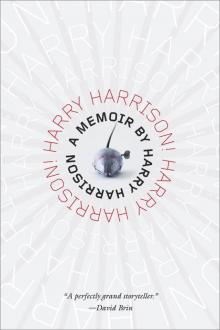 Harry Harrison! Harry Harrison!
Harry Harrison! Harry Harrison!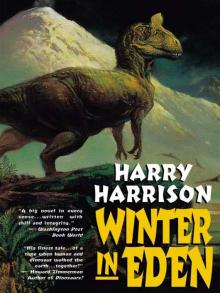 Winter in Eden
Winter in Eden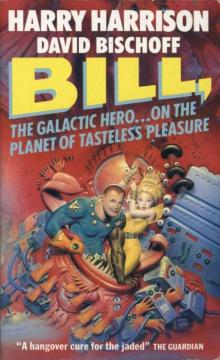 On the Planet of Tasteless Pleasures
On the Planet of Tasteless Pleasures